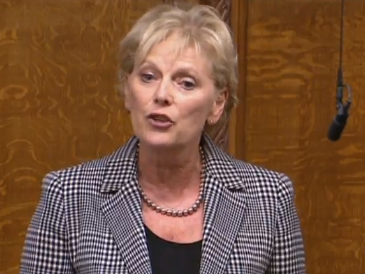
A Conservative MP has repeated her calls for a “Cliff’s Law” to stop suspects being named before they are charged after a number of Sunday newspapers named and pictured a couple arrested in connection with drone disruption at Gatwick airport.
Anna Soubry MP (pictured) said the couple “should not have been named in the media”, adding that a new law was “needed” to make it a criminal offence to name suspects before charge unless it is in the interests of justice.
The pair were pictured on the front pages of the Mail on Sunday, Sunday Telegraph, Sunday Mirror, Sunday Express and Sunday People yesterday morning, as well as on numerous news websites.
But by lunchtime the same day they had been released without charge as Sussex Police eliminated them from their inquiries.
The force said in a statement that a 47-year-old man and a 54-year-old woman, both from Crawley, were arrested, but it did not release their names to the media.
The Mail on Sunday’s splash headline asked: “Are these the morons who ruined Christmas?”
A Mail on Sunday spokesperson declined to comment for this article but Press Gazette understands the newspaper stands by its coverage because it was posed as a question and the article did not say they were guilty.
A spokesperson for the Independent Press Standards Organisation, which regulates each of the newspapers which pictured the couple on their front pages, said it had not been inundated with complaints, but had received fewer than 30 across each of the titles.
Lord Brian Paddick used the opportunity to garner favour for his Private Members Bill which started life in the House of Lords last year.
The Anonymity (Arrested Persons) Bill would prohibit the publication of certain information about people who have been arrested until they have been charged with an offence, and outline the circumstances where such information can be published without it being an offence.
Paddick tweeted: “I have a Private Members Bill awaiting Second Reading in the House of Lords making it illegal to identify suspects before charge, without the authority of a Crown Court judge who must decide if it is in the interests of justice.”
Soubry urged people to support Paddick’s bill by emailing their MP.
She tweeted: “They should not have been named in the media. We need a new law to make it a criminal offence to breach anonymity until charge unless in the interests of justice #CliffsLaw.”
Richard was never arrested over the historical child sex assault allegation made against him, and was told in 2016 that he would face no charges.
Soubry, a former regional broadcast journalist, said in July: “Sir Cliff is not alone and it’s not confined to sexual offences. Suspects should not be named by the media until such time as they are charged.”
Soubry said she would be “more than happy” to call the bill Cliff’s Law and acknowledged that there would be exceptional cases.
Bob Neill, a Conservative MP and chair of the Justice Select Committee, said he “looked forward” to taking this legislation forward with Soubry in 2019.
The pair also had support from Conservative MP Huw Merriman, who tweeted: “Yet another example of reputations trashed because the papers are allowed to publish names before charges brought (often with police in cahoots).
“Have been working with Anna Soubry and Bob Neill to persuade Government to change law to prohibit this appalling unfairness.”
And Michael Fabricant MP, also a Conservative, said he fully supported Paddick’s bill, adding: “Cliff Richard and too many others have been ‘found guilty’ before they were even charged.
“This is not natural justice – nor English jurisprudence. It’s a perversion of justice.”
In response to Soubry’s parliamentary question in July, Prime Minister Theresa May said at the time that it was an “important” but “difficult” issue which “does have to be dealt with sensitively”.
However she appeared to disagree with Soubry’s stance, saying: “There may well be cases where actually the publication of a name enables other victims to come forward and therefore to strengthen the case against an individual.
“So this is, I have to say, I think this is not either you do all of one or all of another. This is an issue for careful judgement – but in exercising that careful judgement the police need to recognise their responsibilities and the media need to recognise their responsibilities as well.”
Guardian media columnist Roy Greenslade suggested the Mail on Sunday had gone “way over the top in its coverage” and that the question mark at the end of its headline would offer little “wriggle room” against a complaint to the Independent Press Standards Organisation or even any legal action.
“Yes, there is a public interest argument that favours disclosure of the facts, Greenslade wrote. “But it does not justify the ‘morons’ splash.”
Picture: Parliament TV
Email pged@pressgazette.co.uk to point out mistakes, provide story tips or send in a letter for publication on our "Letters Page" blog

